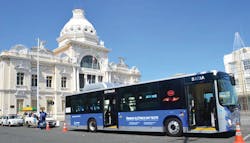Brazil: Viação Rio Vermelho Launches Electric Bus Pilots in Salvador
Parked next to Salvador City Hall on display is a silent electric bus attracting the attention of children, teenagers and the citizens of Salvador. They are curious about the presence of a big blue vehicle, 12 meters in length and 2.5 meters wide – the BYD pure-electric bus. This first long-range electric bus was approved officially for evaluation testing by the city bus operator Viação Rio Vermelho in the Bahia capital on Dec. 2. By paying the standard fare of R$2.80, citizens of Salvador can participate in the testing of this revolutionary electric bus. The testing line is from airport to Lapa, via the coast until December 21.
“She [Alice da Silva] was very happy to see him [the bus].”
Retired and wheelchair bound Alice da Silva Gonçalves, 82 years old, living in southern Bahia, was one of the first people to ride the BYD bus. She was accompanied by her children, Lydia Maria Goncalves and George Bezerra. "We were curious. We saw it there and it looked much easier for Mother to get on than other buses,” reported Lydia Maria. “She [Alice da Silva] was very happy to see him [the bus].” The BYD Electric bus has in-wheel hub motors which remove the need for a transmission or inter-wheel axels; therefore, BYD drops the floor height even lower than where the axels would normally be making the one-step-height of around 9 inches (onto the bus) the lowest in the industry. The bus has a flat floor from the front door to the back. “There is no other bus on the market that is this disabled or elderly-friendly,” stated Stella Li, Senior Vice President of BYD Ltd. In addition to folding ramps for wheelchair loading, the air-suspension systems on the bus allows the vehicle to lower by up to ~3 in making elderly and children loading very easy. Ivanilson Gomes, Municipal Secretary of Sustainable City, stated, “The vehicle has a range of over 250km with up to 80 passengers and is very adapted for disabled use.” According to Gomes, “After the testing phase, the performance of the vehicle in Salvador will be evaluated by the city along with the bus operators. If the bus is approved, then there will be a change in the Bahia capital fleets, but the fares will not be changed. During the testing, the electric bus will operate on normal routes. We will compare standard equipment and make an assessment of outcome. This will be good for all users." The bus is fully electric with three sets of batteries, enabling over a 250km driving range. It has no oil filters, no engine oil to change. “When you compare the total cost of ownership for a Diesel bus and electricity bus, you realize that the electric one is much more advantageous. There is no direct pollution, the battery is recyclable, and bus noise is virtually zero. The body is aluminum, which can also be recycled," describes Vagner Rigon, BYD Sales Manager.
According to Adalberto Maluf, director of the C40 Cities, the BYD vehicle rates highest in CCI-C40 City tests developed for Latin American cities. These CCI C40 Bogota testing results were published in October 2012. The bus is powered by BYD unique Iron-Phosphate batteries. One of the advantages of this vehicle is energy recovery and recharging of batteries through regenerative braking system. The AC charging system of the vehicle is connected directly to grid-power and is touted as "simple" and low cost – it can be installed at bus garages, parking lots and bus stops in the city. The vehicle only moves when all the doors are closed and the driver has to reverse video systems for monitoring passengers and motion in the rear.
